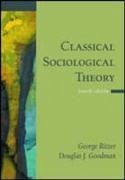- Broschiertes Buch
- Merkliste
- Auf die Merkliste
- Bewerten Bewerten
- Teilen
- Produkt teilen
- Produkterinnerung
- Produkterinnerung
With one of the foremost authorities on sociological theory as lead author, this best-selling text gives readers a comprehensive overview of the major classical theorists and schools of sociological thought. Key theories are integrated with biographical sketches of theorists, placing readings in context and helping students understand the original works of classical authors as well as compare and contrast their theories.
Andere Kunden interessierten sich auch für
![Classical and Contemporary Social Theory Classical and Contemporary Social Theory]() Tim DelaneyClassical and Contemporary Social Theory160,99 €
Tim DelaneyClassical and Contemporary Social Theory160,99 €![Contemporary Sociological Theory and Its Classical Roots Contemporary Sociological Theory and Its Classical Roots]() George RitzerContemporary Sociological Theory and Its Classical Roots167,99 €
George RitzerContemporary Sociological Theory and Its Classical Roots167,99 €![Sociological Theory Sociological Theory]() George RitzerSociological Theory232,99 €
George RitzerSociological Theory232,99 €![Classical Sociological Theory Classical Sociological Theory]() Irving M. ZeitlinClassical Sociological Theory116,99 €
Irving M. ZeitlinClassical Sociological Theory116,99 €![Sociological Theory in the Classical Era Sociological Theory in the Classical Era]() Laura D EdlesSociological Theory in the Classical Era199,99 €
Laura D EdlesSociological Theory in the Classical Era199,99 €![Classical Sociological Theory Classical Sociological Theory]() Classical Sociological Theory36,99 €
Classical Sociological Theory36,99 €![Key Concepts in Classical Social Theory Key Concepts in Classical Social Theory]() Alex LawKey Concepts in Classical Social Theory65,99 €
Alex LawKey Concepts in Classical Social Theory65,99 €-
-
-
With one of the foremost authorities on sociological theory as lead author, this best-selling text gives readers a comprehensive overview of the major classical theorists and schools of sociological thought. Key theories are integrated with biographical sketches of theorists, placing readings in context and helping students understand the original works of classical authors as well as compare and contrast their theories.
Hinweis: Dieser Artikel kann nur an eine deutsche Lieferadresse ausgeliefert werden.
Hinweis: Dieser Artikel kann nur an eine deutsche Lieferadresse ausgeliefert werden.
Produktdetails
- Produktdetails
- Verlag: McGraw Hill LLC
- Revised
- Seitenzahl: 1
- Erscheinungstermin: Juli 2003
- Englisch
- Abmessung: 231mm x 164mm x 20mm
- Gewicht: 717g
- ISBN-13: 9780072824308
- ISBN-10: 0072824301
- Artikelnr.: 21692725
- Herstellerkennzeichnung
- Libri GmbH
- Europaallee 1
- 36244 Bad Hersfeld
- gpsr@libri.de
- Verlag: McGraw Hill LLC
- Revised
- Seitenzahl: 1
- Erscheinungstermin: Juli 2003
- Englisch
- Abmessung: 231mm x 164mm x 20mm
- Gewicht: 717g
- ISBN-13: 9780072824308
- ISBN-10: 0072824301
- Artikelnr.: 21692725
- Herstellerkennzeichnung
- Libri GmbH
- Europaallee 1
- 36244 Bad Hersfeld
- gpsr@libri.de
George Ritzer is Distinguished University Professor at the University of Maryland, where he has also been a Distinguished Scholar-Teacher and won a Teaching Excellence Award. He was awarded the Distinguished Contributions to Teaching Award by the American Sociological Association, an honorary doctorate from LaTrobe University in Australia, and the Robin Williams Lectureship from the Eastern Sociological Society. His best-known work, The McDonaldization of Society (8th ed.), has been read by hundreds of thousands of students over two decades and translated into over a dozen languages. Ritzer is also the editor of McDonaldization: The Reader; and author of other works of critical sociology related to the McDonaldization thesis, including Enchanting a Disenchanted World, The Globalization of Nothing, Expressing America: A Critique of the Global Credit Card Society, as well as a series best-selling social theory textbooks and Globalization: A Basic Text. He is the Editor of the Encyclopedia of Social Theory (2 vols.), the Encyclopedia of Sociology (11 vols.; 2nd edition forthcoming), the Encyclopedia of Globalization (5 vols.), and is Founding Editor of the Journal of Consumer Culture. In 2016 he will publish the second edition of Essentials of Sociology with SAGE.
Preface
Acknowledgments
About the Authors
Part I: Introduction to Classical Sociological Theory
Chapter 1: A Historical Sketch of Sociological Theory: The Early Years
Introduction
Premodern Sociological Theory
Social Forces in the Development of Sociological Theory
Intellectual Forces and the Rise of Sociological Theory
The Development of French Sociology
The Development of German Sociology
The Origins of British Sociology
The Key Figure in Early Italian Sociology
Non-European Classical Theory
The Contemporary Relevance of Classical Sociological Theory
Summary
Chapter 2: A Historical Sketch of Sociological Theory: The Later Years
Early American Sociological Theory
Sociological Theory to Midcentury
Sociological Theory from Midcentury
Late Twentieth-Century Integrative Theory
Theories of Modernity and Postmodernity
Social Theory in the Twenty-First Century
Summary
Part II: Classical Sociological Theory
Chapter 3: Alexis de Tocqueville
Comparative Study
American Politics
The Sociology in Tocqueville's Work
The Key Sociological Problem(s)
Freedom, Democracy, and Socialism
Colonialism
Contemporary Applications
Summary
Chapter 4: Auguste Comte
Comte's Profound Ambitions
Comte's Sociology
Theory and Practice
Criticisms and Contributions
Summary
Chapter 5: Herbert Spencer
Spencer and Comte
General Theoretical Principles
Sociology
The Evolution of Society
Ethics and Politics
Criticisms and Contemporary Applications
Summary
Chapter 6: Karl Marx
Introduction
The Dialectic
Dialectical Method
Human Potential
The Structures of Capitalist Society
Materialist Conception of History
Cultural Aspects of Capitalist Society
Marx's Economics: A Case Study
Communism
Criticisms
Contemporary Applications
Summary
Chapter 7: Emile Durkheim
Introduction
Social Facts
The Division of Labor in Society
Suicide
The Elementary Forms of Religious Life
Moral Education and Social Reform
Criticisms
Contemporary Applications
Summary
Chapter 8: Max Weber
Methodology
Substantive Sociology
Criticisms
Contemporary Applications
Summary
Chapter 9: Georg Simmel
Primary Concerns
Individual Consciousness and Individuality
Social Interaction ("Association")
Social Structures and Worlds
Objective Culture
The Philosophy of Money
Secrecy: A Case Study in Simmel's Sociology
Criticisms
Contemporary Applications
Summary
Chapter 10: Early Women Sociologists and Classical Sociological Theory: 1830-1930
Harriet Martineau (1802-1876)
Charlotte Perkins Gilman (1860-1935)
Jane Addams (1860-1935) and the Chicago Women's School
Anna Julia Cooper (1858-1964) and Ida Wells-Barnett (1862-1931)
Marianne Schnitger Weber (1870-1954)
Beatrice Potter Webb (1858-1943)
Contemporary Applications
Summary
Chapter 11: W. E. B. Du Bois
Intellectual Influences
Studying Race Scientifically: The Philadelphia Negro
Theoretical Contributions
Economics
Karl Marx, Socialism, and Communism
Contemporary Applications
Summary
Chapter 12: Thorstein Veblen
Intellectual Influences
Basic Premises
Substantive Issues
Criticisms and Contemporary Applications
Summary
Chapter 13: Joseph Schumpeter
Creative Destruction
Schumpeter's Broader Economic Theory
Toward a More Dynamic Theory of the Economy
Schumpeter's Sociology
The Future
Contemporary Applications
Summary
Chapter 14: Karl Mannheim
The Sociology of Knowledge
Ideology and Utopia
Rationality and the Irrationality of the Times
Criticisms and Contemporary Applications
Summary
Chapter 15: George Herbert Mead
Intellectual Roots
The Priority of the Social
The Act
Mental Processes and the Mind
Self
Society
Criticisms and Contemporary Applications
Summary
Chapter 16: Alfred Schutz
The Ideas of Edmund Husserl
Science and the Social World
Typifications and Recipes
The Life-World
Intersubjectivity
Realms of the Social World
Consciousness, Meanings, and Motives
Criticisms and Contemporary Applications
Summary
Chapter 17: Talcott Parsons
Parsons's Integrative Efforts
General Principles
The Action System
Change and Dynamism in Parsonsian Theory
Criticisms and Contemporary Applications
Summary
References
Name Index
Subject Index
Acknowledgments
About the Authors
Part I: Introduction to Classical Sociological Theory
Chapter 1: A Historical Sketch of Sociological Theory: The Early Years
Introduction
Premodern Sociological Theory
Social Forces in the Development of Sociological Theory
Intellectual Forces and the Rise of Sociological Theory
The Development of French Sociology
The Development of German Sociology
The Origins of British Sociology
The Key Figure in Early Italian Sociology
Non-European Classical Theory
The Contemporary Relevance of Classical Sociological Theory
Summary
Chapter 2: A Historical Sketch of Sociological Theory: The Later Years
Early American Sociological Theory
Sociological Theory to Midcentury
Sociological Theory from Midcentury
Late Twentieth-Century Integrative Theory
Theories of Modernity and Postmodernity
Social Theory in the Twenty-First Century
Summary
Part II: Classical Sociological Theory
Chapter 3: Alexis de Tocqueville
Comparative Study
American Politics
The Sociology in Tocqueville's Work
The Key Sociological Problem(s)
Freedom, Democracy, and Socialism
Colonialism
Contemporary Applications
Summary
Chapter 4: Auguste Comte
Comte's Profound Ambitions
Comte's Sociology
Theory and Practice
Criticisms and Contributions
Summary
Chapter 5: Herbert Spencer
Spencer and Comte
General Theoretical Principles
Sociology
The Evolution of Society
Ethics and Politics
Criticisms and Contemporary Applications
Summary
Chapter 6: Karl Marx
Introduction
The Dialectic
Dialectical Method
Human Potential
The Structures of Capitalist Society
Materialist Conception of History
Cultural Aspects of Capitalist Society
Marx's Economics: A Case Study
Communism
Criticisms
Contemporary Applications
Summary
Chapter 7: Emile Durkheim
Introduction
Social Facts
The Division of Labor in Society
Suicide
The Elementary Forms of Religious Life
Moral Education and Social Reform
Criticisms
Contemporary Applications
Summary
Chapter 8: Max Weber
Methodology
Substantive Sociology
Criticisms
Contemporary Applications
Summary
Chapter 9: Georg Simmel
Primary Concerns
Individual Consciousness and Individuality
Social Interaction ("Association")
Social Structures and Worlds
Objective Culture
The Philosophy of Money
Secrecy: A Case Study in Simmel's Sociology
Criticisms
Contemporary Applications
Summary
Chapter 10: Early Women Sociologists and Classical Sociological Theory: 1830-1930
Harriet Martineau (1802-1876)
Charlotte Perkins Gilman (1860-1935)
Jane Addams (1860-1935) and the Chicago Women's School
Anna Julia Cooper (1858-1964) and Ida Wells-Barnett (1862-1931)
Marianne Schnitger Weber (1870-1954)
Beatrice Potter Webb (1858-1943)
Contemporary Applications
Summary
Chapter 11: W. E. B. Du Bois
Intellectual Influences
Studying Race Scientifically: The Philadelphia Negro
Theoretical Contributions
Economics
Karl Marx, Socialism, and Communism
Contemporary Applications
Summary
Chapter 12: Thorstein Veblen
Intellectual Influences
Basic Premises
Substantive Issues
Criticisms and Contemporary Applications
Summary
Chapter 13: Joseph Schumpeter
Creative Destruction
Schumpeter's Broader Economic Theory
Toward a More Dynamic Theory of the Economy
Schumpeter's Sociology
The Future
Contemporary Applications
Summary
Chapter 14: Karl Mannheim
The Sociology of Knowledge
Ideology and Utopia
Rationality and the Irrationality of the Times
Criticisms and Contemporary Applications
Summary
Chapter 15: George Herbert Mead
Intellectual Roots
The Priority of the Social
The Act
Mental Processes and the Mind
Self
Society
Criticisms and Contemporary Applications
Summary
Chapter 16: Alfred Schutz
The Ideas of Edmund Husserl
Science and the Social World
Typifications and Recipes
The Life-World
Intersubjectivity
Realms of the Social World
Consciousness, Meanings, and Motives
Criticisms and Contemporary Applications
Summary
Chapter 17: Talcott Parsons
Parsons's Integrative Efforts
General Principles
The Action System
Change and Dynamism in Parsonsian Theory
Criticisms and Contemporary Applications
Summary
References
Name Index
Subject Index
Preface
Acknowledgments
About the Authors
Part I: Introduction to Classical Sociological Theory
Chapter 1: A Historical Sketch of Sociological Theory: The Early Years
Introduction
Premodern Sociological Theory
Social Forces in the Development of Sociological Theory
Intellectual Forces and the Rise of Sociological Theory
The Development of French Sociology
The Development of German Sociology
The Origins of British Sociology
The Key Figure in Early Italian Sociology
Non-European Classical Theory
The Contemporary Relevance of Classical Sociological Theory
Summary
Chapter 2: A Historical Sketch of Sociological Theory: The Later Years
Early American Sociological Theory
Sociological Theory to Midcentury
Sociological Theory from Midcentury
Late Twentieth-Century Integrative Theory
Theories of Modernity and Postmodernity
Social Theory in the Twenty-First Century
Summary
Part II: Classical Sociological Theory
Chapter 3: Alexis de Tocqueville
Comparative Study
American Politics
The Sociology in Tocqueville's Work
The Key Sociological Problem(s)
Freedom, Democracy, and Socialism
Colonialism
Contemporary Applications
Summary
Chapter 4: Auguste Comte
Comte's Profound Ambitions
Comte's Sociology
Theory and Practice
Criticisms and Contributions
Summary
Chapter 5: Herbert Spencer
Spencer and Comte
General Theoretical Principles
Sociology
The Evolution of Society
Ethics and Politics
Criticisms and Contemporary Applications
Summary
Chapter 6: Karl Marx
Introduction
The Dialectic
Dialectical Method
Human Potential
The Structures of Capitalist Society
Materialist Conception of History
Cultural Aspects of Capitalist Society
Marx's Economics: A Case Study
Communism
Criticisms
Contemporary Applications
Summary
Chapter 7: Emile Durkheim
Introduction
Social Facts
The Division of Labor in Society
Suicide
The Elementary Forms of Religious Life
Moral Education and Social Reform
Criticisms
Contemporary Applications
Summary
Chapter 8: Max Weber
Methodology
Substantive Sociology
Criticisms
Contemporary Applications
Summary
Chapter 9: Georg Simmel
Primary Concerns
Individual Consciousness and Individuality
Social Interaction ("Association")
Social Structures and Worlds
Objective Culture
The Philosophy of Money
Secrecy: A Case Study in Simmel's Sociology
Criticisms
Contemporary Applications
Summary
Chapter 10: Early Women Sociologists and Classical Sociological Theory: 1830-1930
Harriet Martineau (1802-1876)
Charlotte Perkins Gilman (1860-1935)
Jane Addams (1860-1935) and the Chicago Women's School
Anna Julia Cooper (1858-1964) and Ida Wells-Barnett (1862-1931)
Marianne Schnitger Weber (1870-1954)
Beatrice Potter Webb (1858-1943)
Contemporary Applications
Summary
Chapter 11: W. E. B. Du Bois
Intellectual Influences
Studying Race Scientifically: The Philadelphia Negro
Theoretical Contributions
Economics
Karl Marx, Socialism, and Communism
Contemporary Applications
Summary
Chapter 12: Thorstein Veblen
Intellectual Influences
Basic Premises
Substantive Issues
Criticisms and Contemporary Applications
Summary
Chapter 13: Joseph Schumpeter
Creative Destruction
Schumpeter's Broader Economic Theory
Toward a More Dynamic Theory of the Economy
Schumpeter's Sociology
The Future
Contemporary Applications
Summary
Chapter 14: Karl Mannheim
The Sociology of Knowledge
Ideology and Utopia
Rationality and the Irrationality of the Times
Criticisms and Contemporary Applications
Summary
Chapter 15: George Herbert Mead
Intellectual Roots
The Priority of the Social
The Act
Mental Processes and the Mind
Self
Society
Criticisms and Contemporary Applications
Summary
Chapter 16: Alfred Schutz
The Ideas of Edmund Husserl
Science and the Social World
Typifications and Recipes
The Life-World
Intersubjectivity
Realms of the Social World
Consciousness, Meanings, and Motives
Criticisms and Contemporary Applications
Summary
Chapter 17: Talcott Parsons
Parsons's Integrative Efforts
General Principles
The Action System
Change and Dynamism in Parsonsian Theory
Criticisms and Contemporary Applications
Summary
References
Name Index
Subject Index
Acknowledgments
About the Authors
Part I: Introduction to Classical Sociological Theory
Chapter 1: A Historical Sketch of Sociological Theory: The Early Years
Introduction
Premodern Sociological Theory
Social Forces in the Development of Sociological Theory
Intellectual Forces and the Rise of Sociological Theory
The Development of French Sociology
The Development of German Sociology
The Origins of British Sociology
The Key Figure in Early Italian Sociology
Non-European Classical Theory
The Contemporary Relevance of Classical Sociological Theory
Summary
Chapter 2: A Historical Sketch of Sociological Theory: The Later Years
Early American Sociological Theory
Sociological Theory to Midcentury
Sociological Theory from Midcentury
Late Twentieth-Century Integrative Theory
Theories of Modernity and Postmodernity
Social Theory in the Twenty-First Century
Summary
Part II: Classical Sociological Theory
Chapter 3: Alexis de Tocqueville
Comparative Study
American Politics
The Sociology in Tocqueville's Work
The Key Sociological Problem(s)
Freedom, Democracy, and Socialism
Colonialism
Contemporary Applications
Summary
Chapter 4: Auguste Comte
Comte's Profound Ambitions
Comte's Sociology
Theory and Practice
Criticisms and Contributions
Summary
Chapter 5: Herbert Spencer
Spencer and Comte
General Theoretical Principles
Sociology
The Evolution of Society
Ethics and Politics
Criticisms and Contemporary Applications
Summary
Chapter 6: Karl Marx
Introduction
The Dialectic
Dialectical Method
Human Potential
The Structures of Capitalist Society
Materialist Conception of History
Cultural Aspects of Capitalist Society
Marx's Economics: A Case Study
Communism
Criticisms
Contemporary Applications
Summary
Chapter 7: Emile Durkheim
Introduction
Social Facts
The Division of Labor in Society
Suicide
The Elementary Forms of Religious Life
Moral Education and Social Reform
Criticisms
Contemporary Applications
Summary
Chapter 8: Max Weber
Methodology
Substantive Sociology
Criticisms
Contemporary Applications
Summary
Chapter 9: Georg Simmel
Primary Concerns
Individual Consciousness and Individuality
Social Interaction ("Association")
Social Structures and Worlds
Objective Culture
The Philosophy of Money
Secrecy: A Case Study in Simmel's Sociology
Criticisms
Contemporary Applications
Summary
Chapter 10: Early Women Sociologists and Classical Sociological Theory: 1830-1930
Harriet Martineau (1802-1876)
Charlotte Perkins Gilman (1860-1935)
Jane Addams (1860-1935) and the Chicago Women's School
Anna Julia Cooper (1858-1964) and Ida Wells-Barnett (1862-1931)
Marianne Schnitger Weber (1870-1954)
Beatrice Potter Webb (1858-1943)
Contemporary Applications
Summary
Chapter 11: W. E. B. Du Bois
Intellectual Influences
Studying Race Scientifically: The Philadelphia Negro
Theoretical Contributions
Economics
Karl Marx, Socialism, and Communism
Contemporary Applications
Summary
Chapter 12: Thorstein Veblen
Intellectual Influences
Basic Premises
Substantive Issues
Criticisms and Contemporary Applications
Summary
Chapter 13: Joseph Schumpeter
Creative Destruction
Schumpeter's Broader Economic Theory
Toward a More Dynamic Theory of the Economy
Schumpeter's Sociology
The Future
Contemporary Applications
Summary
Chapter 14: Karl Mannheim
The Sociology of Knowledge
Ideology and Utopia
Rationality and the Irrationality of the Times
Criticisms and Contemporary Applications
Summary
Chapter 15: George Herbert Mead
Intellectual Roots
The Priority of the Social
The Act
Mental Processes and the Mind
Self
Society
Criticisms and Contemporary Applications
Summary
Chapter 16: Alfred Schutz
The Ideas of Edmund Husserl
Science and the Social World
Typifications and Recipes
The Life-World
Intersubjectivity
Realms of the Social World
Consciousness, Meanings, and Motives
Criticisms and Contemporary Applications
Summary
Chapter 17: Talcott Parsons
Parsons's Integrative Efforts
General Principles
The Action System
Change and Dynamism in Parsonsian Theory
Criticisms and Contemporary Applications
Summary
References
Name Index
Subject Index








